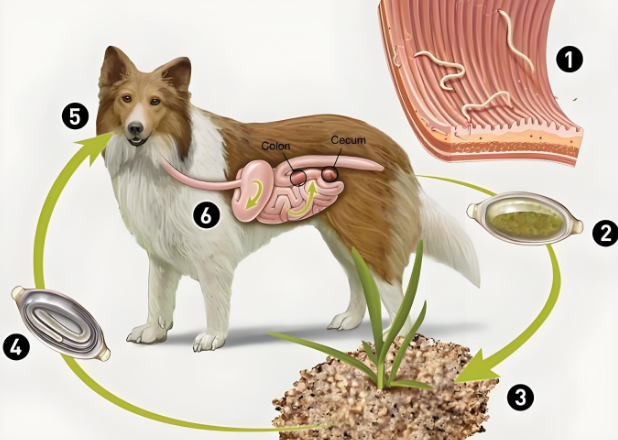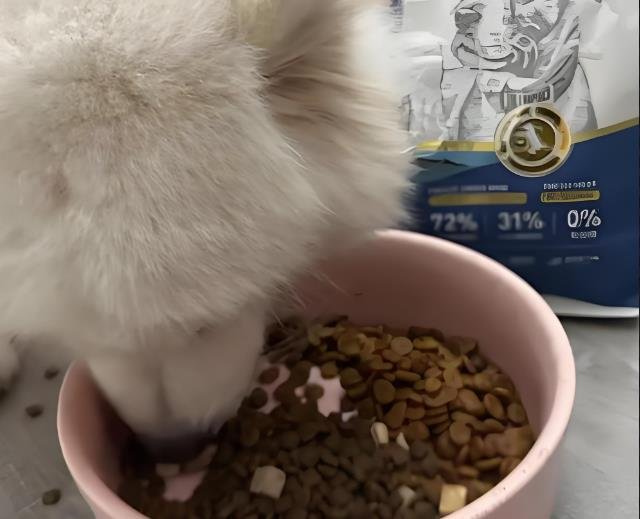Intro: Is your dog suffering from mysterious diarrhea or weight loss? Whipworms—those sneaky intestinal parasites—could be the culprit. Let’s break down everything you need to know about spotting these pests, stopping them for good, and keeping your pup’s tail wagging.

What Exactly Are Whipworms?
Whipworms (Trichuris vulpis) are pesky worms that set up camp in your dog’s gut. They’re smaller than most parasites (about 2 inches long) but pack a punch. Dogs pick up these unwelcome guests by sniffing or eating contaminated soil, grass, or even poop—yep, that gross habit of theirs! Once swallowed, whipworm eggs hatch in the intestines. The larvae burrow into the intestinal lining, mature into adults, and start laying eggs that end up in your yard… starting the cycle all over again.
Fun (Not-So-Fun) Fact: Whipworm eggs can survive outdoors for years, making them one of the toughest parasites to kick.
Is My Dog Infected? Red Flags to Watch For
Some dogs show zero symptoms, while others get hit hard. Here’s what to look out for:
• Bloody diarrhea (often described as “jelly-like”)
• Sudden weight loss despite normal eating
• Lethargy or reluctance to play
• Dehydration (check for dry gums or sunken eyes)
• Anemia (pale gums or weakness)
Why It’s Tricky: Whipworms don’t shed eggs constantly, so a “clean” fecal test doesn’t always mean your dog’s in the clear. Vets often recommend multiple tests or an antigen test to catch these sneaky worms.
Breaking the Cycle: Treatment That Works
Got a diagnosis? Don’t panic! Whipworms are treatable, but you’ll need patience.
- Deworming Meds:
• Fenbendazole: A 3-day course, repeated monthly for 3 months. • Milbemycin (found in heartworm preventives like Interceptor®): Kills whipworms while protecting against heartworms—a two-in-one win. - Clean Like Crazy:
• Scoop poop immediately (eggs become infectious weeks later). • Replace soil in high-risk areas (like your dog’s favorite digging spot). • Steam-clean patios or kennels monthly—heat kills stubborn eggs.
Pro Tip: Even if symptoms vanish, finish the full treatment. Stopping early lets survivors restart the cycle!

Preventing Reinfection: Your Action Plan
- Monthly Preventives: Switch to a heartworm med that also targets whipworms (e.g., Sentinel®, Advantage Multi®).
- Yard Patrol: Keep your lawn trimmed and poop-free. Consider fencing off dirt areas where eggs thrive.
- Hydration & Diet: Boost your dog’s immune system with fresh water and high-quality food—healthy guts fight parasites better!
Did You Know? Dogs with weak immune systems (puppies, seniors, or sick pups) are more vulnerable. Extra TLC for them!
FAQs (Because You’re Probably Wondering…)
• “Can humans catch whipworms from dogs?”
Nope! Dog whipworms (Trichuris vulpis) stick to dogs. But always wash hands after poop duty—better safe than sorry!
• “Why does my dog keep getting reinfected?”
Those eggs are survivors! Stay strict with preventives and yard cleanup.There are preventative medications available to routinely deworm against whipworm infections. The best thing you can do for your pet if they have been diagnosed with whipworms is promptly dispose of their feces to lower the risk of reinfection.
Final Thought: Whipworms are stubborn, but you’ve got this. With vet-backed treatments and a clean environment, your dog can ditch these parasites for good. Now go give your pup an extra treat—they’ve earned it! 🐾


